I have always loved smoothies, but it’s hard to find tasty ones that don’t have added sugar or a ton of calories. This delicious Pineapple Kale Smoothie with Greek yogurt only has just 200 calories per serving and all the sugar is from the pineapple and veggies.
What could be more perfect for quenching the thirst after a hard workout?
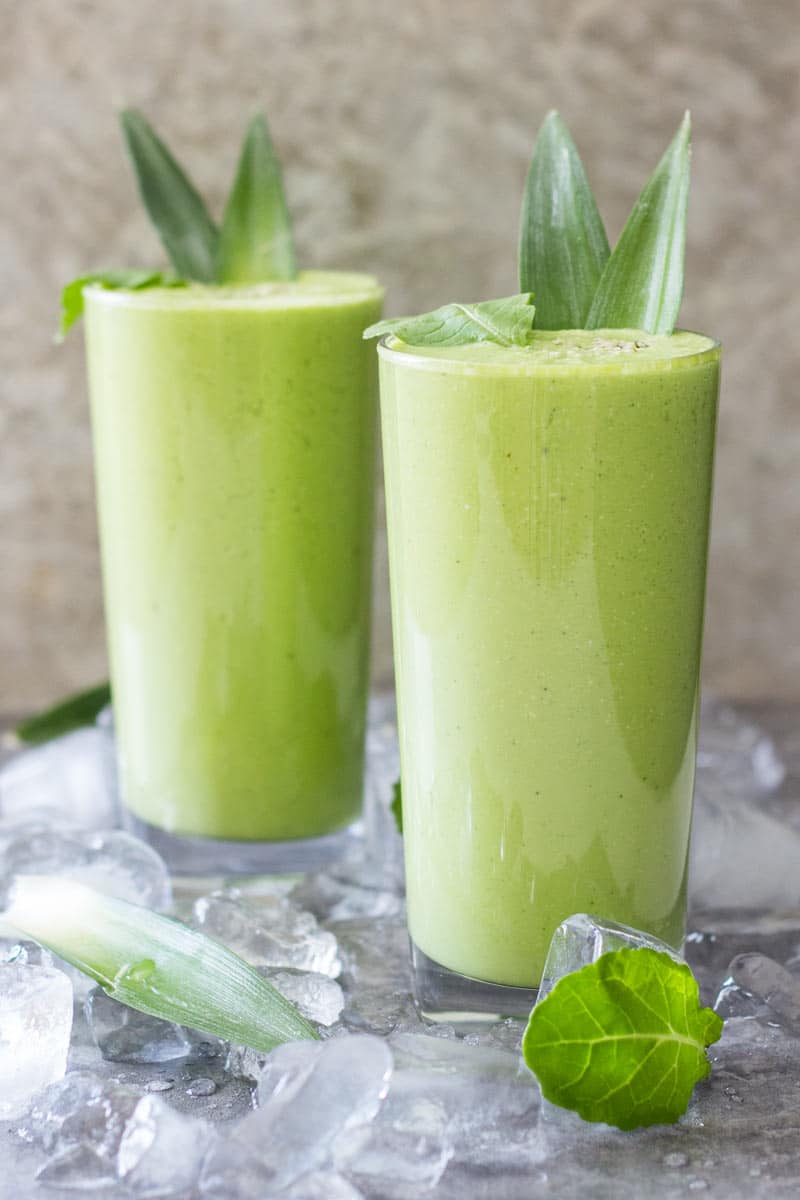
You can use the base of Greek yogurt, kale, and cucumber for a lot of different healthy smoothies. This Pineapple Kale Smoothie is one of my favorites, but you can use raspberries or mango instead of the pineapple if you’d like. Just make sure that whatever fruit or berry you use has a strong flavor with a bit of sweetness to balance the tartness of the yogurt.
Pineapple Kale Smoothie as a post-workout shake
The perfect time for me to enjoy a fruit smoothie is right after a workout. This is the time where I can use the fruit sugar to fill up my energy (glycogen) reserves and the protein from the Greek yogurt to help my muscles recover and grow.
Because the smoothie only takes a few minutes to make, I can be enjoying it in the sun less than 5 minutes after coming home from a workout. Knowing that a delicious pineapple kale smoothie is waiting for me at the end of my workout is all the motivation I need!
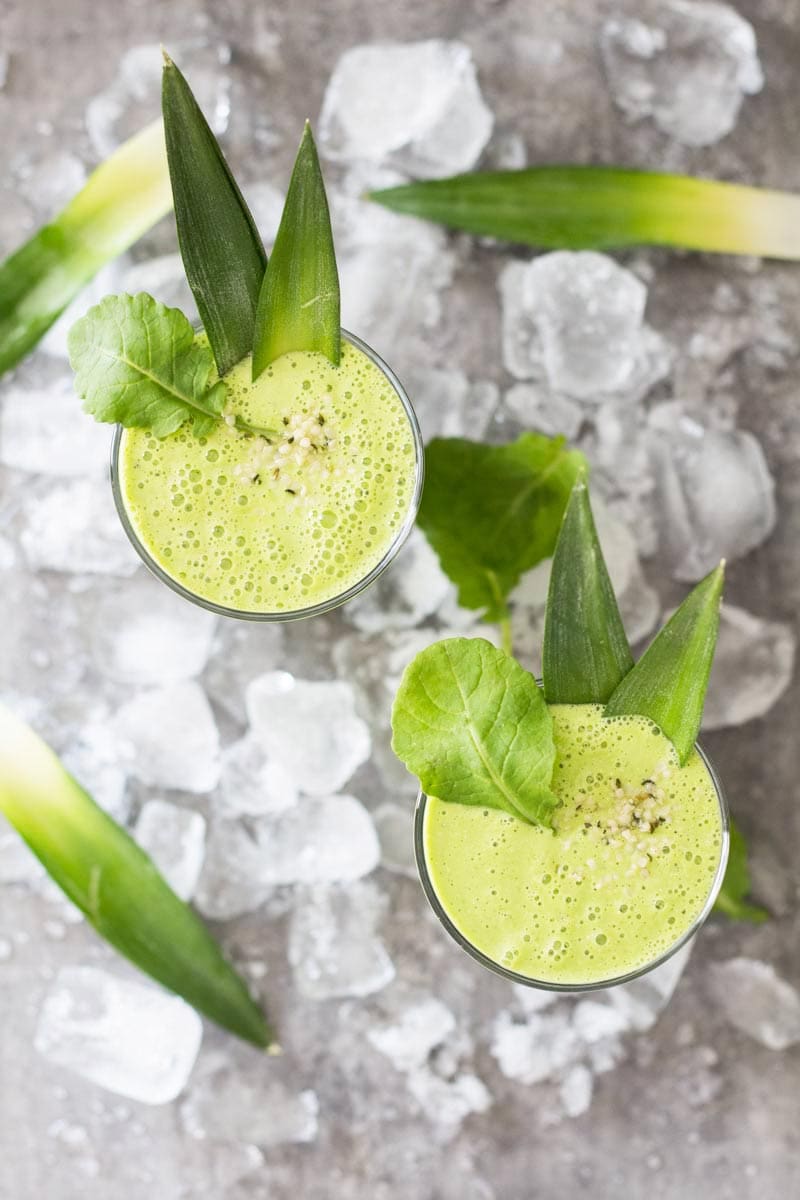
You don’t blend ice into this smoothie (it would get too watery), so make sure that all the ingredients are cold when you start blending. You can also drop a few ice cubes into the smoothie just before drinking it or serve the smoothie glasses in an ice bucket. Just make sure that you serve it COLD!
Speaking of cold, have you tried the Sugar-Free Strawberry Lemonade Popsicle recipe I posted last week? We have been eating a lot of those lately to keep the heat at bay and they are delicious!
I am thinking of inviting friends over to hang out by the pool soon just so I can impress them with my cool smoothies and snacks 😀
The only ingredient we haven’t talked about yet is the hemp seeds. I love that they add both texture and a bit of healthy fat to the smoothie, but you can leave them out if you want to. They aren’t necessary for the smoothie to taste great.
Next time you are tempted to drink a cold soda in the summer heat, try this cool pineapple kale smoothie recipe instead. I promise that it will hit the spot!
If you prefer a vegan smoothie after your workout, you can also try my high-protein Vegan Peanut Butter Smoothie or my Vegan Blueberry Smoothie. They are not quite as thirst quenching as this one, but they both taste deliciously naughty while being full of healthy ingredients!
For even more great smoothie recipes, check out this roundup of the best low-carb smoothies for diabetics!
Pineapple Kale Smoothie
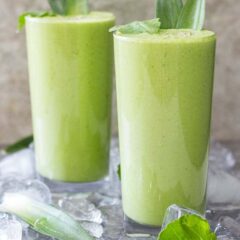
Ingredients
- 1 cup 0% fat Greek yogurt
- 1½ cups cubed pineapple
- 3 cups baby kale
- 1 cucumber
- 2 tablespoon hemp seeds
Instructions
- Put all the ingredients in a blender (I use a Nutribullet) and blend until the smoothie has an even and silky consistency.
- Find yourself a spot in the sun and enjoy!

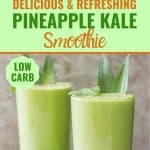
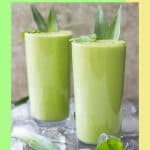
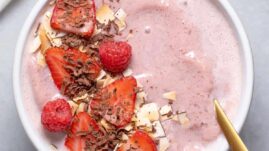
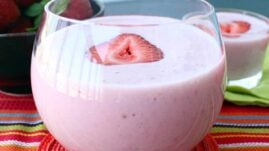
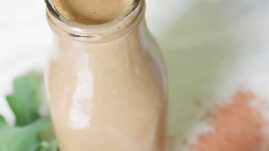
Gisela
Do I need to peel cucumber?
Christel Oerum
No need if you blend the smoothie
Anne
How the recipe for pineapple kale smoothie says sugar free but the nutrition facts say 19 g sugar.
Christel Oerum
The recipe has no added sugar, but both dairy and fruit has naturally occurring sugars which is what you see on the nutrition label
Marisa
I dent see how these smoothies are for diabetic. It may be naturally occurring sugar..but even my diabetes counselors said avoid pineapple orange’s it bananas in smoothies all the time. They don’t keep your levels low. They in fact will spike your sugar levels. 19 grams sugar is Alito of sugar in a smoothies. They told be berries are they best thing in smoothies. Keep glycemic levels in check and mix with Kyle or spinach.
Tobias Oerum
You are right, this smoothie is a little high in carbs and sugar. It’s on our list of recipes to re-work into a low-carb version. In the meantime, please take a look at our roundup of lower-carb smoothies.
Kavita Parmanand
Can you substitute the Greek yogurt for unsweetened almond milk?
Christel Oerum
You can but the smoothie won’t come out as creamy
Jeff
I just made this for breakfast. I substituted the cucumber with ginger root and left out the hemp seeds. It was very good. The ginger gave it a little kick!
Kim
Christel;
Hi,this pineapple kale smoothie looks to good and tastey but the potassium,carbs and sugar seems high to me to comsume.I use a 1 person magic bullet blender,and i was wondering how i can break down the ingredients to put them in my blender.I am curious if this smoothie can be made into popsicle
I am a type 2 diabetic since january 2012 and i am doing the best i can to control my blood sugar which can be a challenge for me but i still work at it on a daily basis,i am on a humalog mix insulin and i buy natural products and healthy ingredients to lower my blood sugar.
Kim
Christel Oerum
If the nutrition profile doesn’t match your needs try looking at some of our other recipes. We even have a low carb popsicle recipe (HERE)
If you do decide to make this one, I’d suggest you cut the ingredients into smaller chunks so it will fit in your bullet (remember to add the liquids first, that makes it easier to blend). I haven’t tried to make it into popsicles but why not
Elizabeta
Hi Christel,
I have made this, it’s a nice smoothie. It has a very low calorie and a good amount of protein.
Thank you for sharing your recipes!
Elizabeta
Ginger
I have made this with both pineapple and mango and both were great. Thank you for everything you do for us with diabetes!